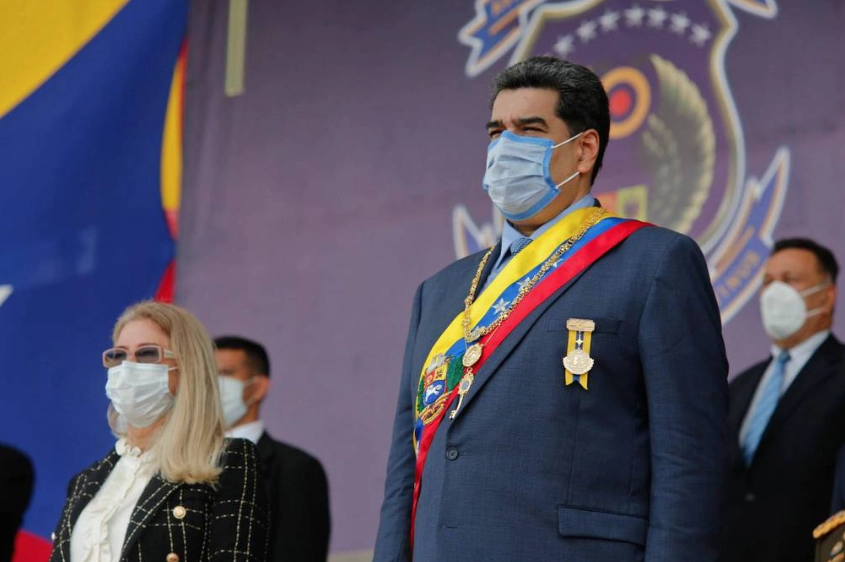Nicolás Maduro’s recent statements that the regime is worthy of the Nobel Prize in Economics, considering the supposed improvement of the country despite international sanctions, besides being a mockery, puts back on the table the fact that it is precisely the political model that has led to the generalized disaster. The solution is not only an economic issue that depends on sanctions relaxing; it is necessary to rebuild the foundations of the Venezuelan State.
The permanence in power of the Chavista regime is at the expense of the lives of the population. While more than 94% of Venezuelans live in poverty, Nicolás Ernesto Maduro, son of Nicolás Maduro and better known as Nicolasito, leads a life of luxury, as seen in his most recent trip to Thailand, and María Gabriela Chávez, daughter of the historic leader, amasses a fortune.
This shows that Venezuela’s problem does not seem to be exclusively due to a lack of resources. Therefore, it is worth questioning the effectiveness of international sanctions to pressure the dictatorship, considering that they have served to justify the disaster and the systematic violations of human rights.
In fact, corruption is largely responsible for the great affectation of the right to food and poverty in the country, as stated by the NGO Venezuela Program Education-Action on Human Rights (Provea) in its recent report Food is not a game: Serious violation to the human right to food in Venezuela.
An example of this is the large corruption network of the CLAP (Local Supply and Production Committees), which in principle was intended to distribute basic need items to the population, but in practice was a mechanism that allowed transactions between state-owned companies and firms to launder money in various tax havens.
Therefore, it is not surprising that Venezuela is perceived as the most corrupt country in the region and is among the last positions in the world, according to Transparency International’s Corruption Perceptions Index 2021.
Democracies and dictatorships cannot be measured by the same standards
The interests that a democratic government might have in fighting corruption do not exist in dictatorships. In fact, their permanence in power is largely due to it.
And it is precisely here that we face the trap from which it is so difficult to escape. The Inter-American Commission on Human Rights (IACHR), has pointed out that, among other institutions, both an independent judicial system and the real exercise of freedom of expression are needed to combat corruption. Therefore, when this type of regime attacks civil and political rights since its beginning, it favors a climate conducive to large-scale corruption that will have an impact on the guarantee of economic and social rights.
In this framework, when the guarantee of these rights is totally degraded, the demands are focused on the minimum conditions for survival and, thus, the issue of political rights becomes secondary.
In short, when a population has nothing to eat, its interest in structural issues diminishes, and its concern is focused on day-to-day life.
Therefore, it is not possible to conceive of a real improvement in the conditions of the Venezuelan population without talking about corruption. In fact, this is precisely what has given rise to the conditions of the country: the belief that the oil bonanza gave license for deep corruption without affecting the life of the population.
This is one of the great fears in the face of possible presidential elections in 2024. Although they will not be competitive, they will require the mobilization of a sector of the population, for which public spending and large clientelistic networks will increase. This, in a context with more incomes, could generate a false sense of improvement.
Corruption is a human rights issue
Corruption and human rights considerations cannot be treated independently. Both are key pieces to talk about democracy, and Venezuela is a clear example of how corruption affects the integrity of human rights. Organizations such as Provea and Venezuela Transparency have denounced that the crisis of the electricity system is due, in large part, to the corruption of the last decades.
Last year it became known that there was no trace in the public accounts of 300 billion dollars, however, this is only a part of the large gaps in the public administration. It is precisely the absence of data, which has been the official policy, which does not allow us to know exactly the magnitude of the embezzlement of the country.
This discretionary use of resources, the generalized impunity and the concentration of institutions have generated favorable conditions for large-scale corruption, and it is precisely this that allows them to remain in power. Therefore, what incentives can there really be for a negotiated transition?
While it is important to make corruption networks visible, it is necessary to admit that protection systems are designed to strengthen democracies, for those governments that are willing to cooperate. But, unfortunately, have little or no impact on the transition of authoritarian governments.
Translated from Spanish by Janaína Ruviaro da Silva












